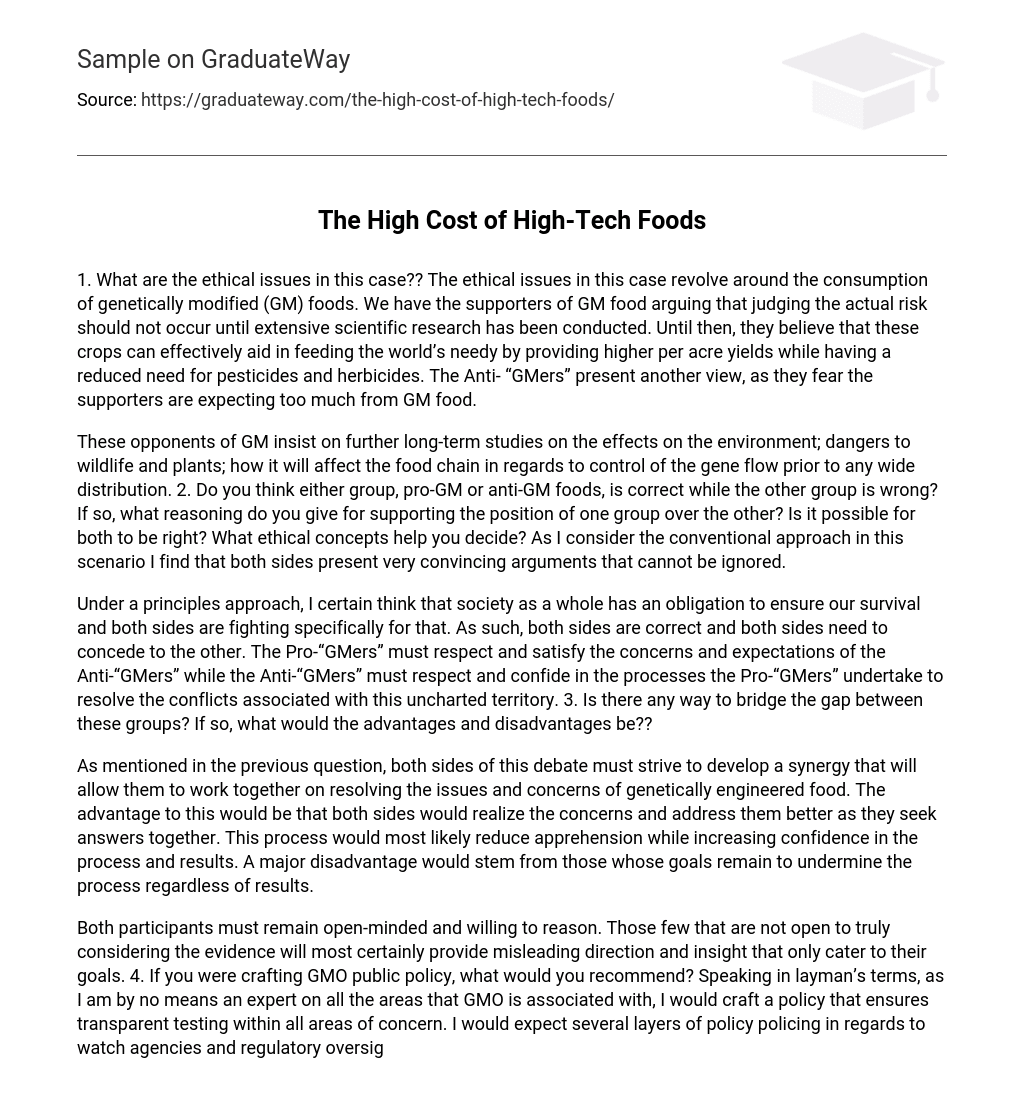1. What are the ethical issues in this case?? The ethical issues in this case revolve around the consumption of genetically modified (GM) foods. We have the supporters of GM food arguing that judging the actual risk should not occur until extensive scientific research has been conducted. Until then, they believe that these crops can effectively aid in feeding the world’s needy by providing higher per acre yields while having a reduced need for pesticides and herbicides. The Anti- “GMers” present another view, as they fear the supporters are expecting too much from GM food.
These opponents of GM insist on further long-term studies on the effects on the environment; dangers to wildlife and plants; how it will affect the food chain in regards to control of the gene flow prior to any wide distribution. 2. Do you think either group, pro-GM or anti-GM foods, is correct while the other group is wrong? If so, what reasoning do you give for supporting the position of one group over the other? Is it possible for both to be right? What ethical concepts help you decide? As I consider the conventional approach in this scenario I find that both sides present very convincing arguments that cannot be ignored.
Under a principles approach, I certain think that society as a whole has an obligation to ensure our survival and both sides are fighting specifically for that. As such, both sides are correct and both sides need to concede to the other. The Pro-“GMers” must respect and satisfy the concerns and expectations of the Anti-“GMers” while the Anti-“GMers” must respect and confide in the processes the Pro-“GMers” undertake to resolve the conflicts associated with this uncharted territory. 3. Is there any way to bridge the gap between these groups? If so, what would the advantages and disadvantages be??
As mentioned in the previous question, both sides of this debate must strive to develop a synergy that will allow them to work together on resolving the issues and concerns of genetically engineered food. The advantage to this would be that both sides would realize the concerns and address them better as they seek answers together. This process would most likely reduce apprehension while increasing confidence in the process and results. A major disadvantage would stem from those whose goals remain to undermine the process regardless of results.
Both participants must remain open-minded and willing to reason. Those few that are not open to truly considering the evidence will most certainly provide misleading direction and insight that only cater to their goals. 4. If you were crafting GMO public policy, what would you recommend? Speaking in layman’s terms, as I am by no means an expert on all the areas that GMO is associated with, I would craft a policy that ensures transparent testing within all areas of concern. I would expect several layers of policy policing in regards to watch agencies and regulatory oversight.
Neither side of this argument can disagree with the other as we already see the effects of something effecting our environment. With everything from children’s accelerated growth rates, to global warming, we continue to affect our environment. GMO policy needs oversight, transparency, openness, honest results, and willingness to cooperate. 5. Do hybrid seeds represent as serious a concern as that represented by GM foods? What policy would you recommend for hybrid seeds and vegetables? As for whether hybridization is deemed a serious concern, that remains more of a personal, philosophical choice.
With hybrids accelerated growth rate and robust disease resistance, it is easy to understand the appeal for commercial growers or that or a stricken environment such as Haiti in this case. On the other hand, the use of hybrid seeds results in a dependence of the seed provider as a majority of hybrids are sterile and do not reproduce. There are limited concerns as to the effects these hybrids have on the human body, as the majority of concerns are dependency related. Given this, policy on the use of hybrids would mimic that of GMO as both effect our environment just in slightly different ways.





